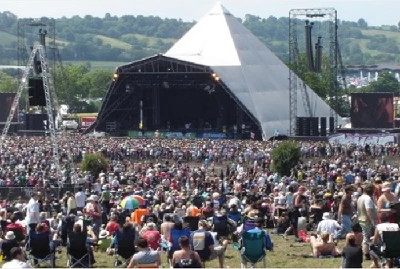Miscellaneous
-
July 2014
published: 9 /
7 /
2014

In 'Condemned to Rock 'n' Roll', Ben Howarth reflects on the BBC's wall-to-wall coverage of this year's Glastonbury
Article
Just why does anybody watch the BBC's wall-to-wall coverage of Glastonbury? Even if your red button helps you avoid the presenters' over-familiarity and the ker-razy antics of the mud-splattered revellers, surely anyone watching at home would rather be there. And if you'd rather not be there, surely you'd rather be doing something else?
Even with incredibly powerful speakers (and incredibly tolerant neighbours), you simply can't recreate what the crowd is hearing. The BBC's sound men – with their curious habit of mixing the vocals right up and everything else right down – will see to that. The normal benefits of home listening are also lost – without a soundcheck, you need the distortion and hecklers as a shield to how bad the music sounds.
I've never heard a convincing explanation for why there is so much Glastonbury on TV. It clearly is a major cultural event, not just another music festival. But, unlike sport – where what the home viewer loses in atmosphere is gained in slow-motion replays – it is obvious to everyone that watching at home is a distant second best.
There are occasional nods to the wider 'Glastonbury experience' that makes this festival so much more significant than the likes of Reading and T In The Park. But the main intention is to showcase music. So wouldn't the BBC would be much better off setting up their own festival, and using equipment designed to record music for broadcast?
And that's where it gets really confusing. Because the BBC already do that. They host their own 'Big Weekend' festival, and regularly record live music for broadcast, both short 'in studio' sessions and in the form of full sets. So why broadcast every note on every stage of Glastonbury? And, to come back to my original question, why on earth watch it?
I suspect that the popularity of the BBC's Glastonbury coverage is not – as it might initially seem – a sign of a music industry in vibrant health, but the opposite. Instead, it offers a desperately needed dose of unpredictability into a world where consuming music has becoming increasingly passive and sterile.
Watching Glastonbury, therefore, offers a rare treat. The chance to hear something you weren't expecting – something that can't just be 'favourited' and saved for later. Something where there isn't already someone else on the internet who heard it first.
It is one of the few ways contemporary music fans can 'try before you buy'. Up until the late 1990s, purchasing an album carried a certain degree of risk. A handful of tracks may have been played on the radio or featured on cover-mounted CDs. Some albums might be placed in those strange 'listening posts' that HMV and OurPrice used to offer. But, mostly, the only way to find out what a whole album sounded like was to buy it.
To get the same experience now, the music fan has to actively shun modern conveniences. Even if the tracks aren't uploaded wholesale onto YouTube, most albums are usually streamed in full by the label in the weeks leading up to their release. Even if you manage be avoid hearing it until its official release date, you will then to strongly encouraged to listen to samples before finalising your purchase.
So, for one blissful weekend, even the sofa-based music fan gets to be a musical innocent once more. Experiencing music for the first time, forming their own opinions, absorbing their own memories.
Of course, it's too good to last. Only a week after its over, and we are once again downloading anything we've not heard from the 'year's best albums so far' lists (June being the new December), and then not finding time to listen to it. Roll on Glasto 2015.